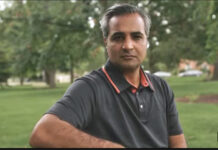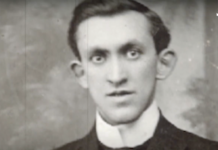By Oswald J. Smith —
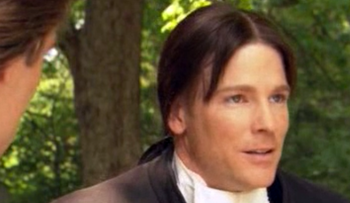
As a boy he thought he was a Christian. He was taught that he could only be saved by keeping all the commandments of God. He considered himself a Christian because he read his Bible, prayed, attended church faithfully — and was not as bad as others.
As John grew into young adulthood he still thought of himself as a Christian. “I was doing so much and living so good a life,” he reflected. He set apart an hour or two a day for religious devotions. He took communion every week.
“I watched against all sin, whether in word or deed. I prayed for inward holiness,” he recounted.
John began to study for the ministry and became a student of theology at Oxford. While at Oxford he visited prisons, the sick and impoverished, doing as many good works as he could fit into his schedule. “I fasted on Wednesdays and Fridays, diligently strove against sin and practiced self-denial,” he noted.
After his years of study at Oxford, John was ordained to the ministry. He decided to become a missionary and left England for America to preach among Native Americans.
While crossing the Atlantic, this was his daily routine on board the ship:
From 4 to 5 private prayer
From 5 to 7 public Bible reading
From 8 to 9 public prayers
From 9 to 12 Bible study
From 12 to 1 testimony
From 2 to 4 reading aloud or witnessing
From 4 to 5 evening prayers
From 5 to 6 private prayers
From 6 to 7 public reading
From 7 to 8 evening service
From 8 to 9 public teaching
Despite this impressive regimen, his education at one of the most prestigious universities in the world, and his ordination, John’s religion became a burden. It only made him miserable. He had no joy in his heart, no peace in his soul. He was religious and sincere, but he had no assurance his sins were forgiven.
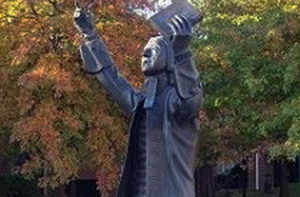
Could a man be a minister or a missionary and still not be saved? Could he spend years in the study of theology and yet remain in darkness? Could he earn degrees, put on robes and be ordained, but still not know Christ? Could he endure indescribable hardship, turn from every sin and live a sincere, upright, religious life and not be saved?
Among his fellow passengers on the ship were some Moravians, one of the oldest Protestant denominations in the world. As John observed their behavior, he was impressed by the way they served other passengers and never seemed to complain.
Stormy seas
During one of their worship services, a rogue wave broke over the ship, split the mast in pieces, and poured down between the decks. Screams of terror broke out among the English passengers, but the Moravians calmly continued singing their hymns and praying.
John was astounded by their calm demeanor and approached one of their leaders. “Weren’t you afraid?” he asked.
“I thank God, no,” the man replied.
“But weren’t your women and children afraid to die?” John asked.
“No, our women and children are not afraid to die,” the man said mildly.
John recognized he still harbored a fear of death within himself. If he was a true Christian, he reasoned, he would have no fear of death. He continued to ponder this in his heart.
After John arrived in America, he had an encounter with another Moravian pastor who asked him some personal questions. “Have you the witness within yourself?” the pastor inquired. “Does the Spirit of God bear witness with your spirit that you are a child of God?”
John was stumped and didn’t know how to respond.
“Do you know Jesus Christ?” the pastor continued.
“I know He is the Savior of the world…” John answered.
“True, but do you know He has saved YOU?”
“I hope He has died to save me,” John replied, somewhat weakly.
“Do you know yourself?”
“I do,” John replied, but in his heart, he feared they were vain words.
A missionary in Savannah
John served as a missionary for two years in Savannah, Georgia, among Native Americans and other immigrants. Somewhat discouraged by his experience there, he decided to give up and return to England. As he departed, he said, “I went to America to convert Indians; but oh, who shall convert me?”
“Who…will deliver me from this evil heart of unbelief?” he asked. “I have a fair summer religion. I can talk well and believe myself while no danger is near, but let death look me in the face and my spirit is troubled. Nor can I say, ‘To die is gain.’”
When John returned to England he consulted with Moravian Pastor Peter Bohler. John confessed to Peter he thought he should stop preaching. How could he continue to preach what he himself did not possess?
“Preach faith till you have it,” Peter advised him, “and then because you have it you will preach it.”
John preached his first message of ‘salvation by faith alone’ to a death-row prisoner. He recognized now that salvation was by faith, not works. But he still couldn’t grasp the idea that salvation could happen in a moment – that it could be instantaneous.
He began to search the Scripture. “I could not understand how this faith should be given in a moment; how a man could at once be turned from darkness to light, from sin and misery to righteousness and joy in the Holy Ghost.”
John poured over the Book of Acts. “To my utter astonishment, I hardly found any instances there other than instantaneous conversions,” he noted. He found only sudden conversions! None of them were gradual. All were instantaneous.
Because of his background and training he couldn’t accept this conclusion. It may have been this way during the time of the Apostles he reasoned, but not today.
Peter Bohler brought several people to John who gave their witnesses to him of their instantaneous conversions, “from darkness into light, out of sin and fear into holiness and happiness.”
John was struck by what he heard. “I could now only cry out: ‘Lord, help my unbelief.’”
He couldn’t deny the testimonies of these witnesses who had sudden conversions. He began to preach this new faith-oriented message in his church, even though he did not yet possess it himself. But he met a hostile reaction within his own church. Before long, he found the doors of the churches where he ministered closed against him.
But the hour was at hand for John to pass from death into life. At long last, he was to experience this conversion for himself.
The service at Aldersgate
He attended a Moravian service on Aldersgate Street in London, where a minister read from Martin Luther’s preface to the Book of Romans.
John describes this significant moment: “About a quarter before nine, while he was describing the change which God works in the heart through faith in Christ, I felt my heart strangely warmed. I felt I did trust in Christ, Christ alone, for salvation: and an assurance was given me, that He had taken away my sins, even mine, and saved me from the law of sin and death.”
Glory to God! John Wesley, the Episcopalian clergyman, had finally found Christ in a personal, saving way. He trusted in Christ, in Him and Him alone, without works, without any efforts of his own.
John noted the change in his heart immediately after his conversion. “I have constant peace – not one unholy thought. And I have freedom from sin – not one unholy desire.”
Such was the experience of the great founder of Methodism, the spiritual father of untold multitudes.
Like the Apostle Paul, both men were highly educated. Both were deeply religious. Paul was a member of the Sanhedrin. John was an ordained minister of the Anglican Church. Neither was saved. Both had to be converted.
If Wesley could do so much in the church, and yet not know Christ personally, what about you?
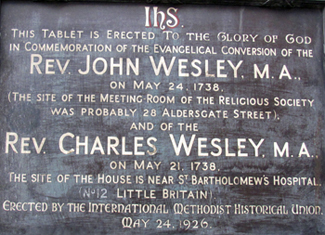
Religion without Christ is like an empty shell without a kernel. It is dead. Religion is not salvation. It is Christ who saves.
You may be a member of the church and yet not be saved. You may be very sincere and still not know Christ. You may perform many good deeds and never be born again. Let me urge you to make your calling and election sure. Be certain. Nothing else matters. It is Jesus Christ or eternal death. Therefore choose Christ and choose Him now.
“For we have all become like one who is unclean [ceremonially, like a leper], and all our righteousness (our best deeds of rightness and justice) is like filthy rags or a polluted garment; we all fade like a leaf, and our iniquities, like the wind, take us away [far from God’s favor, hurrying us toward destruction].(Isa.64:6, amplified)
If you want to know more about a personal relationship with God, go here
Used by permission (patrickhbooth@gmail.com) Edited by Mark Ellis

